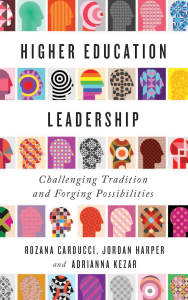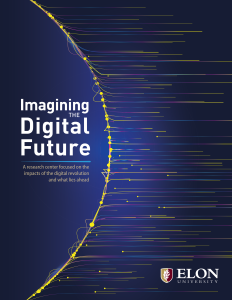From our Shelf
With more than 250 titles produced in 2024, Elon experts address real-world challenges through recent publications.
 Higher Education Leadership: Challenging Tradition and Forging Possibilities
Higher Education Leadership: Challenging Tradition and Forging Possibilities
Carducci, R., Harper, J., & Kezar, A. (2024). Johns Hopkins University Press. https://doi.org/10.56021/9781421448787
Higher education faculty Rozana Carducci (Elon University), Jordan Harper (Morgan State University) and Adrianna Kezar (University of Northern California) critically examine leadership in higher education and advocate for systemic change to dismantle oppressive structures like neoliberalism and white supremacy. The authors challenge traditional models and promote collaborative, equity-driven leadership approaches. Drawing on decades of scholarship, they provide a comprehensive analysis of current leadership practices, identify gaps and propose new directions. Through case studies and discussion questions, the book encourages readers to envision leadership as both a challenge and a transformative tool for creating inclusive, anti-racist and equitable educational environments.
 The Impact of Artificial Intelligence by 2040
The Impact of Artificial Intelligence by 2040
Rainie, L. & Anderson, J. (2024). Imagining the Digital Future Center. Accessible online.
In this study, Lee Rainie, director of Elon’s Imagining the Digital Future Center and scholar-in-residence, and Janna Anderson, the center’s founding director and professor of communications, examine AI’s potential societal impact by 2040, using a public opinion survey and expert interviews. Concerns about privacy, employment, politics and social civility were widespread, though many hoped AI would improve health care. Experts predicted ai would redefine human identity and require societal restructuring. While some feared AI’s negative effects on human agency and mental health, others emphasized its benefits in areas like medicine, education and innovation, reshaping economies and daily life.
Articles
Lies, Counter-lies, and Disinformation in the Marketplace of Ideas
Armijo, E. (2024). Indiana Law Journal, v. 100, 193-248. Accessible online.
Professor of Law Enrique Armijo critiques the traditional First Amendment marketplace of ideas theory and argues that it overvalues false speech and fails to address the harm caused by counter-lies — deliberate disinformation designed to deceive. Adopting a social epistemology lens, he advocates for prioritizing truth over deception and recognizing the right of listeners to not be intentionally misled, and reconsidering protections for knowing falsehoods.
Communicating and Combating Algorithmic Bias: Effects of Data Diversity, Labeler Diversity, Performance Bias, and User Feedback on AI Trust
Chen, C. & Sundar, S. S. (2024). Human–Computer Interaction, 1–37. https://doi.org/10.1080/07370024.2024.2392494
Assistant Professor of Communication Design Cheng Chen investigates whether showcasing racial diversity in AI training data and labelers’ backgrounds influences user trust and perceptions of fairness, even when biases exist. Findings from a factorial experiment (n=597) show diversity cues increase perceived fairness, while feedback invitations enhance agency but may reduce usability. These results offer insights for designing socially responsible AI interfaces.
Achieving the American Dream, Homeownership Wealth, and Voluntary Military Service: A Snapshot of Homeowners Who Transitioned to Adulthood During the First Gulf War
Depro, B. (2024). Journal of Veterans Studies, 10(1), 214–221. https://doi.org/10.21061/jvs.v10i1.544
Associate Professor of Economics Brooks Depro uses the American Community Survey to analyze Gulf War-era homeowners. He finds that while many veterans achieved mortgage-free homeownership, their reported home values were 10% lower than non-veterans, raising concerns about institutional trust and military recruitment challenges.
Did They Stay or Did They Go? Following Up on Intimate Relationship Outcomes 2 Years into the COVID-19 Pandemic
Fleming, C. J. E. & Weaver, M. (2024). Couple and Family Psychology: Research and Practice. Advance online publication. https://doi.org/10.1037/cfp0000255
Associate Professors CJ Fleming (psychology) and Mark Weaver (statistics) examine the impact of the COVID-19 pandemic on relationship satisfaction and commitment among 592 participants from April 2020 to March 2022. Their findings revealed a consistent decline in satisfaction and a slight drop in commitment, highlighting the importance of prioritizing relationship repair in pandemic recovery.

